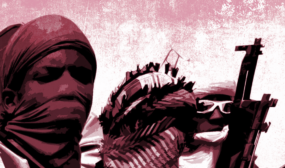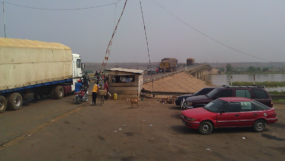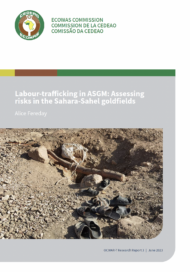Posted on 26 Mar 2021
On 10 March 2021, Libya’s Government of National Unity (GNU), led by Prime Minister Abd al-Hamid Dabaiba, won a parliamentary vote of confidence with a sweeping majority. This is the country’s first new government since 2015, when the interim Government of National Accord (GNA) was established. Although there is optimism over the GNU’s prospects, the new government faces complex challenges.
After the revolution in 2011, Libya’s economy became captured by widespread armed group predation. As a result, criminal economies such as fuel, arms, migrant smuggling and drug trafficking thrived beyond levels that had been experienced before in Libya and had a significant destabilizing impact on the region and beyond. These illicit dynamics both fed off Libya’s political fractures and helped to further them, compounding the GNA’s inability to provide effective governance and security throughout the country.
In part because of the ineffectiveness of its predecessor to address illicit dynamics, the advent of the GNU has been met with significant optimism, especially from the international community. Though its planned duration is short, with elections expected in December, there are hopes that the new government will start addressing Libya’s myriad of issues.
The new government faces three significant challenges around changes that are needed. The first relates to the dynamics that brought the GNU about. The second is the continued entrenchment of hybrid armed groups that hold de facto power, have infiltrated institutions and benefit from Libya’s licit and illicit economies through their criminal business models. The third is the empowerment of foreign actors, whose interventions in Libya have become more overt.
Political alliances
The GNU’s first challenge is political and comes about from how Dabaiba navigated the UN-led Libyan Political Dialogue Forum (LPDF) process that created the government. The LPDF process was meant to reshuffle patronage networks, help avert further conflict and create an environment where elections could be held.
Dabaiba was not initially seen as a front-runner. His victory over better-known contenders hinged on his willingness to accommodate the maximum number of factions across the country’s political landscape, by promising government positions in exchange for support and allegedly even going to the extent of offering bribes.
This strategy produced an overstaffed cabinet that Dabaiba formed from among personal associates and elites, with parliamentarians lobbying him to appoint friends and relatives. Rather than competence or incorruptibility, ministerial selection hinged on muhasasa: a process whereby governmental positions are proportionally allotted to factions based on local and regional origins.
Politically, Dabaiba’s coalition-building approach may be justified. It was what the LPDF set him up for, as it sought to transcend Libya’s conflict divides and to keep spoilers at bay. Yet, in its execution, his approach risks exacerbating corruption and compounding institutional weakness. The numerous ministerial portfolios and the parochial way they have been filled opens the government to exploitation by actors intertwined with illicit economies.
Connections between senior politicians and armed groups will most likely lead the latter to seek to exert influence over government affairs, stymieing state-building and institutional development initiatives. Heightened influence by armed groups will also in all likelihood impede efforts to address illicit economies, which many armed groups profit from or are directly involved in. And continued corruption and impunity risk further alienating ordinary Libyans from the ruling elite, undermining the trust-building that is desperately needed after a decade of worsening governance.
Finally, while Dabaiba’s muhasasa approach to power-sharing arrangement may avert a relapse into conflict in the short term, it could sow the seeds for conflict in the medium term, as many of the factions in the new government and external allies have a vested interest in delaying elections. A continuation of the current government would maintain, if not expand, these actors’ access to the state’s resources or protection from state interference.
This protracted stay in power would, however, compromise the GNU’s very purpose – readying Libya for elections – and enable those sidelined by the new government to mobilize local constituencies and armed actors against it. This risks exacerbating instability and state weakness, which are conducive to the growth of illicit economies and predation by armed groups.
Armed groups
The second key challenge for the new government is how to address Libya’s constellation of large, well-equipped armed groups. These challenges emanate from choices made by the previous government and Dabaiba’s strategic approach to government formation.
In Tripoli, the previous government placed numerous armed groups under the Presidency Council in a bid to pre-empt the LPDF’s possible failure. This made these groups quasi-official – holding mandates, organizational autonomy and access to government budgets – without real oversight or inhibitors on their predation and their involvement in criminal economies.
Tripoli’s armed groups backed Dabaiba’s election as a means to sideline former interior minister Fathi Bashagha, who publicly declared his intentions to mount a campaign against corruption and crime, reining in these groups and dismantling them. Dabaiba’s win forced him into a deeper alliance with the groups under the Presidency Council, in part to guarantee a smooth transition and help the government establish itself in the capital. The alignment is fundamentally opportunistic, with its longevity dependent on these groups’ perceived interest in upholding this government.
These dynamics place the new government in a particularly weak position, as armed groups will be able to leverage a mantle of quasi-legitimacy as cover for predation – much as they did under the GNA. Efforts to address human smuggling, drug trafficking and other forms of criminality are unlikely to be vigorously prosecuted in the short term by the GNU. Its term in office could present a window in which various forms of criminality increase in scale and scope, likely posing a particularly steep challenge to governance and security.
The Prime Minister faces similarly fraught challenges in dealing with eastern Libyan factions, including Khalifa Haftar, leader of the Libyan Arab Armed Forces (LAAF), the largest armed group in the country. Haftar, while weakened by his failed 2019–2020 war to take Tripoli, is nonetheless still expected to rebuff the GNU’s attempts to subordinate him to civilian rule. For Haftar, autonomy is critical, as the LAAF’s constituent armed factions risk fragmentation if his supremacy is compromised.
Dabaiba has so far avoided addressing armed group issues in the east by refraining from appointing a minister of defence, instead taking on the role himself. This move signals ambivalence towards Haftar and allows the inclusion of other eastern factions in his cabinet.
The GNA adopted a similar strategy towards eastern Libya in 2016. That gambit failed, in part because of Haftar’s extensive foreign support, which allowed him to violently retain control. Dabaiba’s efforts to sideline Haftar are likely to face similar challenges, owing to the same combination of foreign influence and Haftar’s reliance on repression to retain relevance.
As in western Libya, the inability of the GNU to assert control in the east is likely to further enable illicit economic activity. Components of the LAAF are deeply involved in illicit economies in the areas under their control, including human smuggling from eastern Africa into Libya, and overland and maritime drug trafficking. Appropriation and predation of government resources is commonplace.
Haftar is likely to become more reliant on illicit economies to stabilize his control more than ever before. He is dependent on the funds he derives from this to keep constituencies in the east that are challenging him – aggrieved by insecurity and unfulfilled promises of benefits – from taking further action. In turn, Haftar may well take advantage of Dabaiba’s expected inability to quell the muhasasa-driven competition over illicit rents to enable his reassertion of authority over eastern Libya.
Foreign meddlers
The final key challenge for the GNU is the range of foreign actors operating in Libya. In the west, Turkey and mercenaries under its control are consolidating their positions; in the country’s centre are Russian mercenaries; and the United Arab Emirates (UAE) continues to pour military supplies into the east via Egypt. And although Russia, Turkey and the UAE have acquiesced to the Dabaiba government, they have not significantly altered their activities or signalled a withdrawal of their forces.
The medium- and long-term interests of these foreign actors differ. Russia and Turkey expect the costs of their respective military actions to be underwritten by the Libyan government and aim to leverage their presence for pecuniary interests. By contrast, the UAE’s meddling in Libya is less driven by economic considerations. If it perceives the GNU’s action as running counter to its strategic interests, it will be far more willing to act, irrespective of economic or political consequences.
No foreign entities are known to be involved in illicit economies in Libya in any significant way, though in some cases forces aligned with them – such as Sudanese and Chadian mercenaries – are implicated in protecting or extorting a variety of criminal enterprises. The challenge foreign actors pose is their interest in sustaining a status quo in which the Libyan government remains weak in order to maximize their power to influence events.
Dabaiba’s efforts to balance political and armed factions, and to organize elections is complicated by their presence. As long as foreign actors remain involved in Libya and are able to wield influence, efforts to address core issues salient to Libyans – such as functional governance, safety and security, and the power of armed groups and criminal actors – will remain particularly difficult for the new government.
Conclusion
The government’s broad international support may enable it to tackle some of Libya’s systemic challenges in ways that its predecessors were not. Yet, having appeased numerous factions to get endorsed, Dabaiba will be constrained in his ability to achieve these goals.
Politicians and armed groups who expect that they will benefit from his tenure risk paralyzing Dabaiba’s government and delegitimizing it with the Libyan public. The same applies to foreign actors’ expectations and the temptation by the new government to appease them.
Similarly, efforts to tackle Libya’s illicit and criminal economies are likely to suffer if the current status quo is sustained. Government capacity could decline further if armed groups increase their predation of state resources. Weak government institutions and law enforcement bodies would remain challenged in their ability to arrest or deter criminal actors who are often protected by, or integrated into, armed groups. Meanwhile, in the absence of reform, economic disparities will widen, which may well force more ordinary Libyans to rely on black markets and cross-border smuggling and trafficking.
Addressing these challenges will be an uphill battle but a necessary one to avert protracted instability in the country. To achieve that goal, the new government will need to focus on state capacity-building during its mandated term, steering away from the temptation to prolong its mandate.
To counter Turkey, Russia and the UAE’s focus on maintaining a status quo, with complete disregard for the implications, the US, the EU and member states should redouble efforts to assist Dabaiba in meeting his government’s mandate to hold elections and prepare the ground for a functional Libyan government to follow.



